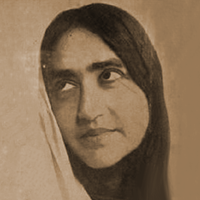Profile of Wajida Tabassum
Born : 16 Mar 1935 | Amravati, Maharashtra
Died : 09 Dec 2010
uTh ke mahfil se mat chale jaanā
tum se raushan ye konā konā hai
uTh ke mahfil se mat chale jaana
tum se raushan ye kona kona hai
Wajeda Tabassum was born in 1935 in Amravati, Maharashtra, India. After earning her master's degree in Urdu from Osmania University, the family in 1947 moved to Hyderabad. Much of her writing is in a Hyderabad locale and the Dakkani dialect of Urdu, over which she has uncommon mastery. Quite a few of her stories are critiques of the decadent life associated with the old aristocracy of that region. In 1960 she married, against the wishes of her family, her cousin Ashfaq. The couple now lives in Mumbai. Wajeda Tabassum is a firm believer and feels that her writing is so powerful because a religious force inspires her. Wajeda Tabassum has published twenty-seven books. Utran is her best-known piece. When it was published in 1977, she was enounced because of attitudes the heroin displayed that were considered inappropriate of a Muslim woman, but the story was also widely appreciated. It has been translated into eight languages and filmed for television.
Some of her stories have been made into movies and Indian television serials. Her controversial 1975 story titled "Utran" (translated as 'Cast-Offs' or 'Hand-Me Downs') was made into a popular soap opera on Indian television in 1988. "Utran" was reprinted in English translation as part of an anthology of 20 short stories titled Such Devoted Sisters in 1994 and from there was made into a movie in 1996 under the title Kama Sutra: A Tale of Love, with a script by Mira Nair and Helena Kriel
Her books include Teh Khana, Kaise Samjhaoon, Phul Khilne Do, Utran, Zakhme-e-Dil Aur Mahak Aur Mahak and Zar, Zan, Zamin, which she had published in 1989.

